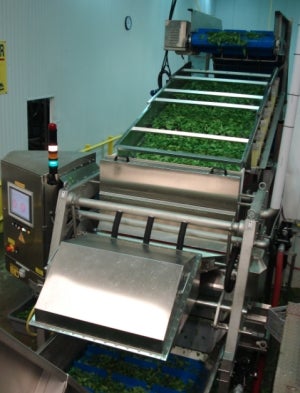
A major sensor-based sorting systems provider says American lettuce growers and processors are rapidly adopting its leading-edge technology to substantially increase efficiency and output quality.
TOMRA Sorting Solutions reports fast-rising sales of technology such as its patented FLUO laser technology, which sorts lettuce based on its chlorophyll content, and Advanced Foreign Material Detector, an expert distinguisher of defects and foreign materials, in the US.
These features are available with TOMRA Genius belt sorters – incorporating cameras and offering options such as lasers and Nimbus free-fall, double-sided laser sorters.
Explaining the FLUO technology, Karel Strubbe, sales manager, Americas and Oceania, said: "Sound lettuce typically has high levels of chlorophyll. Our breakthrough, developed with the University of Brussels, creates a clear black-and-white contrast between good lettuce and inferior produce or foreign objects, containing lower amounts of the pigment or none at all.
"The technology is effective enough to detect small chlorophyll-containing areas – such as parts of leaves between products – and defective elements, including stones, plastic, glass, wood, metal and rotten spots. It therefore offers American lettuce growers and processors very high detection efficiency and extremely low false reject rates."
In addition to different types of lettuce, TOMRA’s FLUO technology is applicable to a range of other vegetables containing chlorophyll, including peas, green beans and spinach.
TOMRA’s Advanced Foreign Material Detector (AFMD) identifies defects and objects previously difficult to distinguish, because of similar structure or colour characteristics. These are sorted on product-specific features and with an optical configuration not limited to one application.
Explaining a particularly popular AFMD application among lettuce sorting organisations, Mr Strubbe said it was revolutionising the way baby leaf processors operated.
He explained: "These organisations can now introduce radicchio or frisée lettuce into their mixes before they enter the sorting unit. Prior to the AFMD’s optical technology being introduced, US processors had to mix these elements in after sorting, running the risk they still contained imperfections.
"The AFMD means processors can now sort virtually every kind of baby mix, targeting defects perfectly. The detector has additional value in identifying mould sometimes prevalent in baby leaf spinach too."
Mr Strubbe said the AFMD’s capabilities significantly improved results, minimised false detections, enhanced processing line flexibility, maximised efficiency and elevated the quality and safety of the end produce to new levels for consumers, while maintaining the highest yield at unsurpassed throughputs.
In summary, he said: "Combining our different offerings, such as the FLUO laser technology and AFMD, offers a wide variety of defect detection capabilities, covering all types of lettuce. This ranges from foreign material identification in multicolour assortments, such as spring mix, to highly efficient core detection in processed lettuce, including iceberg or romaine, for example.
"The ideal solution for each American lettuce sorting customer depends on factors such as their line capacity, sorting priorities and budget. This, and the modular nature of our systems, means we discourage customers from thinking in terms of ‘standard’ machines. Instead, we advise them to share their particular requirements with us, so we can provide solutions tailor-made for their needs."










